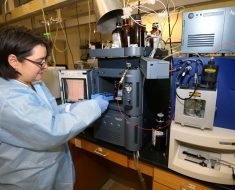An enzyme that drives the growth of an often-lethal childhood brain cancer may hold the key to a future treatment, says a McMaster University-led study.
Researchers discovered that by blocking the production of an enzyme called DHODH, they were able to halt the growth of MYC gene-amplified medulloblastoma in mouse models, the most aggressive subtype of this cancer.
First author William Gwynne said that while blocking DHODH stops the cancer spreading, healthy brain and nerve cells are spared. This will avoid the after-effects of current treatments, including radiotherapy and chemotherapy, which can impair children’s brain development even if their cancer is successfully treated.
“This potential treatment pathway will allow us to kill the weeds but save the flower of the developing brain,” said Gwynne, a post-doctoral researcher of the Centre for Discovery in Cancer Research
“This DHODH treatment target is full of promise, but it will take several years before we can reach the clinical trial stage. This potential new treatment, unlike current ones, will not be toxic to the developing brain.”
The study was published in the journal Cancer Cell on Nov. 10.
Source: Read Full Article





